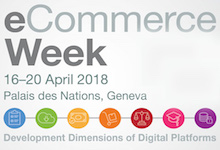Bringing the voice of consumers to the negotiation table
17 Apr 2018 10:00h - 11:30h
Event report
[Read more session reports from the UNCTAD E-Commerce Week 2018]
The event was co-organised by Public Citizen and was aimed at discussing the importance of protecting consumer interests and representing their interests during trade negotiations, given the large amounts of data generated by users every day and the reliance of digital goods on that information.
The panel discussion was moderated by Dr Burcu Kilic (Research Director, Public Citizen). She opened the session by emphasising the need to understand what data is and what rights protecting consumers there are. She underlined these concerns with a video on data exploitation, created by Privacy International.
Mr Francisco Vera Hott (Advocacy Officer, Privacy International) said that the concept of privacy is usually associated with the right to be left alone. With the emergence of smart technologies and increased connectivity this view is being challenged. According to Vera, living in a ’datafied society’ brings with it the danger of discrimination due to the lack of privacy. It has now become almost impossible to avoid having an online presence which can be used by companies, sometimes even without the knowledge of the consumers.
He therefore raised questions regarding how the validity of the information that is available on us can be verified and how the impartiality of that information could be ensured. He argued that transparency on data collection processes and analysis is therefore key for the protection of consumers and that accountability mechanisms need to be put in place. Additionally, he emphasised that data and privacy protection are not barriers for trade, and that ‘our data should flow alongside our rights.’
Ms Léa Auffret (Trade Team Leader, European Consumer Organization (BEUC)) stressed that consumers should not rely on companies to protect their data. In this regard, the implementation of the EU’s General Data Protection Regulation (GDPR) might be able to offer better protection.
She called the pending implementation of the GDPR a revolution, given that it will put consumer rights at the centre of business practices and will strengthen consumer positions towards businesses. The strengthened position will be achieved through a variety of user rights ranging from the right to be informed about the use of private data to the right to be forgotten. She also thinks that this approach will be reflected in future trade negotiations at the World Trade Organization (WTO), given that consumer protection is likely to be placed at the centre of agreements.
Mr Sanjay Kumar Mangla (Fellow, Consumer Unity and Trust Society (CUTS)) answered the question on whether privacy is a mainly European concern by recalling the August 2017 ruling by India’s Supreme Court which identifies the right to privacy as being a fundamental human right. He also pointed out that online data disclosure policies should also be adapted to data which is disclosed offline.
The speaker further said that there should be a flow of data in accordance with laws. For this to be possible, he stressed the importance of adopting laws and strong implementation mechanisms. He emphasised the necessity of these laws in light of multilateral trade agreements, in which countries primarily have their own interests in mind. For this reason, it is crucial that all countries have strong data protection rules when joining the negotiation table.
Ms Julie Dawson (Director, Regulatory and Policy, Yoti) presented Yoti, a digital identity company used as an online verification method. She elaborated the company’s open accountability mechanisms that allow customers to have control over their data and explained the data minimalisation principle that prevents the company from accessing the users’ data once an account has been verified.
In addition to that, she spoke about the necessity for consumers to inform themselves about companies’ approach to ethics.
Ms Vahini Naidu (Economic Counsellor, Permanent Mission of South Africa to the WTO) reminded the audience of the last ministerial conference in Buenos Aires in 2017, where no consensus had been reached. She noticed the trend to informal negotiations at the WTO, given the diverse range of issues and differences in scope with which countries approached certain topics. According to Naidu, plurilateral agreements might therefore lead to more effective regulations rather than finding minimal common agreements.
She also pointed out that the UN already has a robust consumer protection framework that includes an e-commerce section which might be strengthened through regional or continental approaches.
Prof. Jane Kelsey (Law Professor, University of Auckland, New Zealand) presented the Transpacific Partnership (TPP) agreement which she identified as being a codification of the demands of the US technology industry. She therefore urged law-makers to gather a deeper understanding of the negotiated terms. She named access to source codes as an example that would allow regulators to verify that algorithms and systems work in non-discriminatory manners. Under the current TPP template, this would be impossible, given that the terms foresee that source codes remain proprietary.
It is therefore dangerous, she argues, to simply trust decision-makers to protect consumers, given the little understanding of underlying issues. She also invited law-makers to reach out to civil society representatives in order to include the consumers’ perspective in these types of agreements.
By Cedric Amon
Related event

